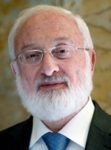
PETACH TIKVAH, Israel — On the morning of November 4 in the U.S, some people will smile and some people will cry. Hopefully, the aftermath of the election will not be as contentious as the months leading to it have been, and the president will be able to do his job in a more constructive atmosphere than in the past four years.
I’m not hopeful, but perhaps the challenge ahead will convince the parties to cooperate. And that challenge is the coronavirus. Whoever occupies the White House after January’s inauguration will have an impossible task on his hands. He will have to deal with an exhausted American people, a healthcare system on the brink of collapse, and worst of all, pervasive hopelessness in the absence of a vaccine for Covid-19. And when medicine fails, people have no one to rely on but each other.
The tensions and the hatred being exposed in American society have always been there, but it seems like they’ve never been as exposed as they are today. As frightening as they may be, exposing them is the first step toward correction. Just as we must diagnose a disease before we can treat it, hatred must be exposed and acknowledged before we can mend it. However, while the exposure happens spontaneously, overcoming it requires a conscious effort. If people decide to rise above their pervasive, negative feelings and unify the American society, they will overcome anything, including the virus, and will show the world how to defeat Covid. If they fail to unite, the consequences will be horrendous.
The first thing to realize in the healing process is that there are no superfluous elements in American society. Every part of it has its role, even if it seems as though it does nothing but harm. The trick is to relate to each part of society not as a competitor over territory or power or wealth, but as a complementing element without which America cannot be the powerful country that it is.
Think of the human body. Within the body, each organ functions very differently, often in contradicting manners, yet feeds on the same source of energy and food, namely oxygen and sugars. If the organs competed against each other in the struggle for supply of these essentials, we would die along with the organs that supposedly “won.”
This, by the way, is what happens with cancer. There are many tumors that aren’t deadly because they don’t “kidnap” blood vessels and don’t deplete the neighboring organs of food and energy. These lumps may stay in our body for years without causing any serious harm. But when a tumor begins to “snatch” blood vessels and deplete neighboring organs, when it begins to spread and tries to “take over,” that “self-centered” behavior turns it from a benign growth to a malignant tumor, and we have to pull it out or it will kill us.
Therefore, the plight of society is not its diversity. This is actually the source of its vitality and strength. The plight of society is people’s self-centered attitude, the fact that everyone feels that they are more entitled than others instead of seeing society as a system where everyone is vital.
And what is true for America is true for the world. Countries are depleting Earth’s resources and fighting for dominance because of the exact same approach that is destroying American society. In the case of the world, the situation is even worse. Today, we are at a point where if we don’t reverse course, we will destroy each other. The choice is simple: world-connection or world war.
In today’s globalized world, no country can rely on itself. Self-sufficiency is an impractical fantasy. Since every country is dependent on other countries, it makes perfect sense to cooperate, just as the example of organs in a healthy body. Without this approach, countries will resort to their former self-centered policies which will result in mutual destruction. Indeed, we are entering a dramatic phase in the history of humankind where unity or destruction will be our only options.
*
Michael Laitman, Ph.D., studied philosophy and Kabbalah at the Russian Academy of Sciences in Moscow, and now resides in Petach Tikvah, Israel. He has published more than 40 books on a variety of topics.